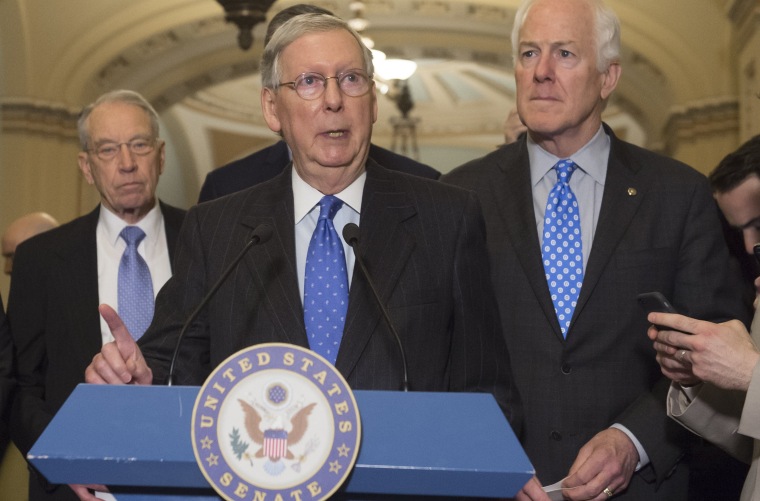Senate Majority Leader Mitch McConnell insisted Tuesday that Supreme Court nominee Neil Gorsuch will be confirmed this week despite Democratic efforts to block him.
As the full Senate began debate on President Donald Trump's pick, McConnell said Republicans have the votes to change the rules — the so-called "nuclear option" — if Democrats carry through with their filibuster threat.
The clock is ticking on the showdown as lawmakers prepare to leave Washington for Easter recess at the end of the week. Despite many expressing concern about how the fight could forever change the Senate and the nation's highest court, members of both parties have remained firm in their respective partisan corners.
McConnell said it "appears" Democrats will oppose the procedural cloture vote that would end debate and allow the nomination to proceed to a final vote. The procedural vote needs the support of 60 senators — a hurdle the GOP cannot overcome on its own.
“We’ll find out on Thursday,” when that vote occurs, McConnell said. “But either way, we will be moving toward confirming Judge Gorsuch on Friday.”
To move forward past a successful filibuster, Republicans would have to change the Senate rules, a move that would impact future Supreme Court nominees and reduce the influence of the minority party.
Republicans say that it’s up to Democrats to stand down and allow Gorsuch to pass. They blame Democrats for ratcheting up a confirmation battle over a jurist that they say is well within the mainstream.
“Miracles happen,” said Sen. Pat Roberts, R-Kansas. “If we get another four or five Democrats on board, then this whole thing is unnecessary.”
Democratic Leader Chuck Schumer, however, says that McConnell has a choice and can ask President Donald Trump to send a new nominee.
“Senator McConnell would have the world believe that his hands are tied. That the only option after Judge Gorsuch doesn’t earn 60 votes is to break the rules to change the rules. That could not be further from the truth,” Schumer said. “Every time in history of this country that a Supreme Court has failed to earn the necessary votes to pass the Senate, the answer has been to change the nominee. Not the rules. We believe that is exactly what should happen now.”
Schumer also noted McConnell's treatment of President Barack Obama's Supreme Court nominee, Merrick Garland, who was picked to replace Justice Antonin Scalia after his death in February of 2016. McConnell denied Garland a hearing or a vote, leaving the seat vacant for more than a year.
"Both sides I know are pointing fingers at the other in this debate — saying that the other side started it. We did not even get our nominee, when Sen. McConnell broke 230 years of Senate precedent, didn’t even allow Judge Garland a hearing or a vote," Schumer said.
Related: What is the Nuclear Option and Why Does it Matter?
And while Republicans are blaming Democrats for pushing them to take drastic measures, some Republicans are uncomfortable with the impending outcome that will allow Gorsuch and any future Supreme Court nominee to pass through the Senate with a simple majority of 51 votes.
Senator John McCain, R-Ariz., dismissed any notion that the Senate could run more smoothly if the so-called “nuclear option” is invoked.
“I would like to meet that idiot. I would like to meet that numskull that would say that,” McCain told reporters Tuesday. “That after 200 years, at least 100 years of this tradition where the Senate has functioned pretty well, they think it’d be a good idea to blow it up. Idiot. Whoever says that is a stupid idiot who has not been here and seen what I’ve been through and how we were able to avoid that on several occasions. And they’re stupid and they’ve deceived their voters because they’re so stupid.”
McCain, angry at Democrats for blocking Gorsuch, is also frustrated with his leader, McConnell. When asked if he thought McConnell was reluctant to change the Senate rules, McCain said he was when the Democrats did so in 2013 — a move that allowed all cabinet and judicial nominees (except the Supreme Court) to pass with a simple majority.
“Well I know he had great reluctance when the Democrats were going to do it. I mean, he used to rail and complain about it and how [it was] the destruction of the United States Senate when the Democrats were going to do it,” McCain said of McConnell.
Vice President Mike Pence attended his party’s weekly luncheon, but senators filed out somber, revealing few details about what was discussed — an odd departure from many Tuesday policy lunches when senators are willing to discuss in general terms the topic of discussion.
Sen. Susan Collins, R-Maine, who had hoped that there could be a deal worked out with Democrats to avert the showdown, said Tuesday that she has no such expectations.
“I think it’s extremely unlikely, regrettably,” Collins said.
Some worry that this latest effort to change the rules will further degrade any remaining comity that exists in the Senate. A unease exists that if the 60-vote threshold is no longer required for any executive branch nominee, which could be the case by the end of this week, then the next threat would be to get rid of the 60-vote threshold on legislation.
McConnell dismissed those concerns.
“There's not a single Senator in the majority who thinks we ought to change the legislative filibuster. Not one,” he said.

